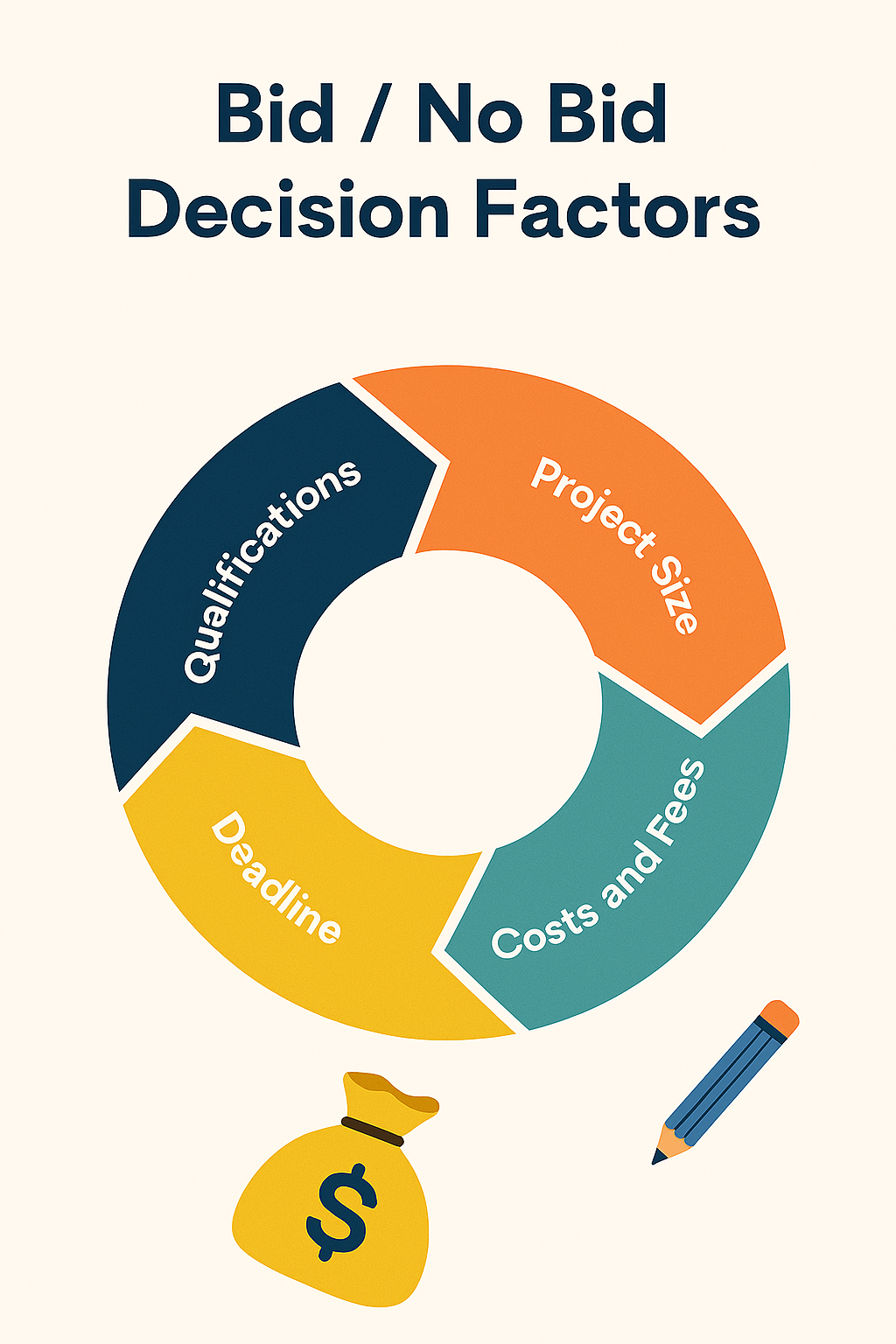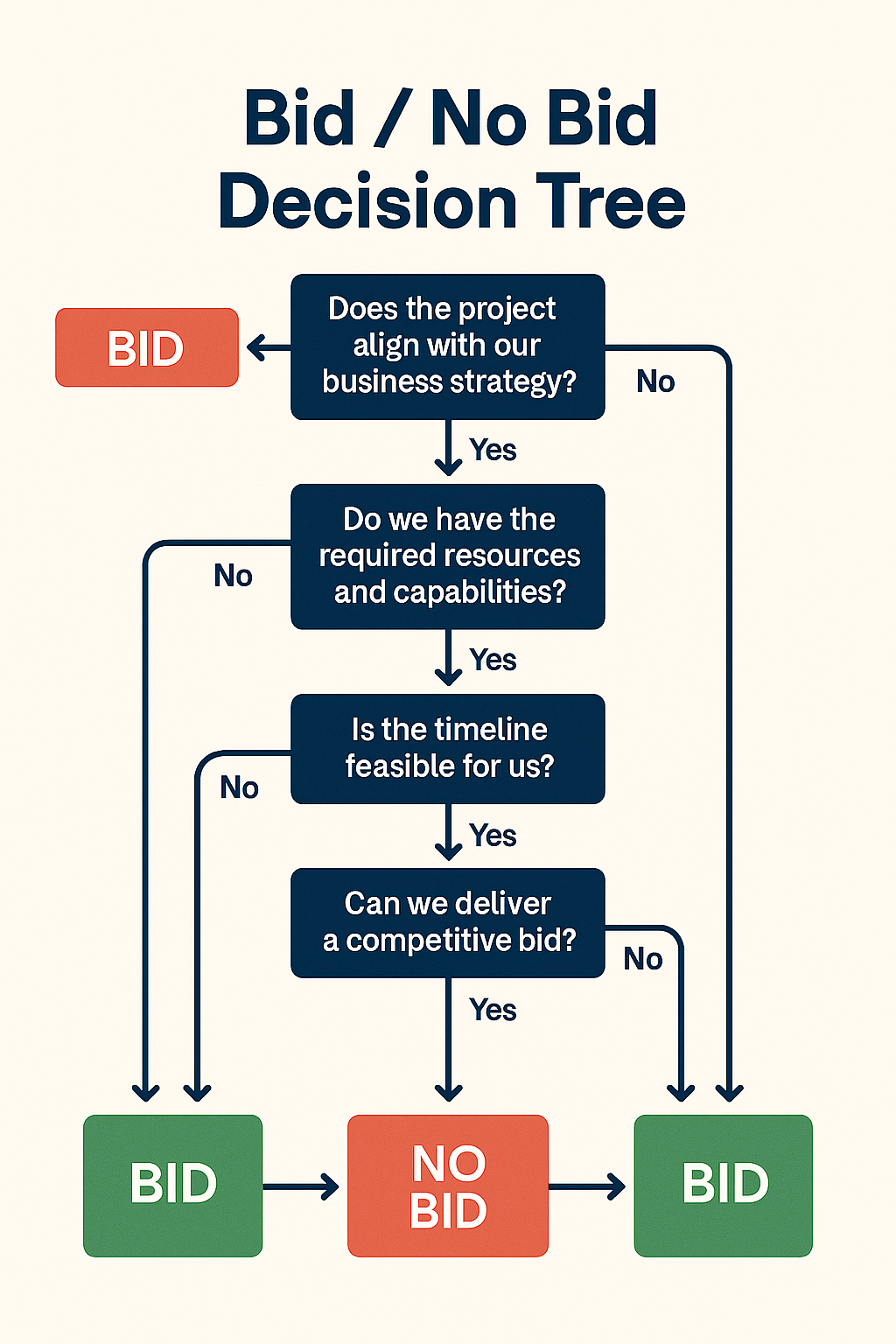Bidding is a crucial process for many businesses, particularly those in industries such as construction, consulting, and government contracting. However, deciding whether to submit a bid or not is not a simple decision. The Bid or No Bid choice requires careful consideration of various factors to ensure that the company’s resources, time, and financial investments are well spent. Getting it wrong could lead to financial losses, strained relationships, or missed opportunities.
This article examines the key factors businesses must consider when deciding whether to submit a bid. Understanding these decision factors enables companies to maximize profitability, manage risk effectively, and enhance their success rate in competitive bidding processes.
-
- Bid or No Bid is a crucial decision impacting profitability.
- Assess financial viability to ensure the project is profitable.
- Weigh potential rewards against project risks.
- Consider your resources and capabilities before submitting a bid.
- Analyze market conditions to understand competition and prevailing trends.
- Build strong client relationships for long-term success.
- Utilize structured evaluation tools to make informed decisions.
- Avoid incorrect decisions that lead to financial losses.
What is a Bid or No Bid Decision?
A “Bid or No Bid” decision refers to the process of determining whether a company should submit a proposal in response to a request for proposal (RFP), invitation to tender (ITT), or similar business opportunity. It’s a crucial decision in the sales and project acquisition process, often involving multiple departments within the organization.
This decision is based on an analysis of whether the company possesses the necessary resources, capabilities, and potential for success in the project, as well as whether the project aligns strategically with the company’s overall goals.
Key Bid or No Bid Decision Factors to Consider
In any bid or no-bid decision, several crucial factors must be assessed. Let’s take a closer look at these factors.
1. Financial Viability
The first question businesses should ask when evaluating a bid opportunity is: Can we make money on this project?
Budget Constraints: A company must check that the bid aligns with its financial capacity. If the costs associated with fulfilling the contract exceed the potential returns, the company could be setting itself up for a loss.
Profit Margin Expectations: Profit margins are a major factor. Companies often reject bids if the return on investment (ROI) isn’t significant enough to justify the time, effort, and resources required.
The financial health of a company should play a central role in determining whether a bid is worthwhile to pursue.
2. Risk Assessment
Every business decision involves some level of risk. When it comes to bidding, risk should be thoroughly evaluated to avoid unanticipated complications.
Risk vs. Reward Analysis: A critical component of the bid/no bid decision is comparing the potential risks to the rewards. Does the expected reward justify the risk, or is it better to pass on this opportunity?
Legal and Regulatory Risks: Some bids may involve complex legal or regulatory requirements that could expose a company to significant risk. Understanding the legal framework and ensuring compliance with all necessary regulations is essential before deciding to bid.
Risk management enables businesses to understand the risks they are taking on and assess whether the project can be executed successfully without jeopardizing the company’s reputation or financial stability.
3. Capability and Resources
Does your company have the necessary resources to win and execute the bid? An honest evaluation of resources is crucial in determining the feasibility of undertaking a new project.
Resource Availability: Every bidding process demands resources—time, labor, materials, and technology. A company must assess whether it has enough capacity to deliver on the project requirements.
Team Expertise and Skills: Winning a bid requires a team with the right expertise and skills. If your team lacks the necessary knowledge or experience to deliver quality work, it may be best to sit this one out.
Ensuring that you have the right resources and team in place is crucial to both submitting a competitive bid and successfully fulfilling the project if you are awarded the contract.
4. Market Conditions
Market conditions can significantly impact the likelihood of winning a bid and the project’s overall profitability.
Competitive Landscape: Understanding the number of competitors and their strengths is vital. If the market is saturated with high-quality competitors, the likelihood of winning might be slim, especially if your company cannot offer a unique value proposition.
Economic Factors: Economic factors, including inflation, interest rates, and material availability, can significantly impact the project’s success. These elements should be considered when making a bid decision, as they may affect both the project’s costs and its viability.
A strong understanding of the market will help businesses decide whether to engage in a competitive bid or to wait for more favorable conditions.
5. Client and Relationship
Bidding on a project is also about relationships. A company’s reputation and its long-term business objectives must be taken into account when making a bid/no-bid decision.
Reputation of the Client: The client’s reputation plays a crucial role in determining whether to pursue the bid. A good relationship with a reputable client may present future opportunities, making it worthwhile to consider even if the project seems risky.
Past Experiences and Relationships: If your company has worked with the client before, the decision may be easier, especially if past projects went smoothly. A positive track record with the client can lead to favorable terms and a higher likelihood of winning the bid.
Building and maintaining strong relationships with clients is a powerful factor that can influence the success of future bidding opportunities.

How to Evaluate the Potential for Winning a Bid
Once the initial decision factors have been assessed, companies must evaluate their potential to win the bid. The following factors can help:
Competitive Analysis
It’s essential to understand your competition. Assessing your competitors’ strengths, weaknesses, and track record helps predict whether you have a competitive edge.
Thoroughly understanding the client’s expectations and requirements can help you tailor your proposal. If your solution aligns with their needs, your chances of success improve.
Proposal Fit
A winning proposal must meet the technical specifications outlined in the RFP. A proposal that doesn’t align with the client’s expectations is likely to be rejected, even if it is competitively priced.
Offering a solution that balances quality with cost-effectiveness is crucial. A proposal that offers excellent value for the price will have a higher chance of winning, even in a competitive environment.
Internal Processes for Making the Bid Decision
Having a structured and repeatable process is essential for making effective bid/no-bid decisions.
Bid/No Bid Evaluation Team
A team dedicated to evaluating bids can offer diverse perspectives, ensuring that all factors are considered. This team typically includes financial experts, project managers, legal advisors, and sales professionals.
Structured Evaluation Criteria
Having clear evaluation criteria such as a bid decision matrix or scoring system helps ensure the decision-making process is objective and consistent across different opportunities.
Past Performance Data
Using data from previous bids to inform current decisions can be highly beneficial. By understanding what has worked (and what hasn’t) in past bidding processes, businesses can make more informed decisions.

Tools and Strategies for Improving Bid Decision Making
Businesses can benefit from using tools and strategies that improve the decision-making process.
- Bid Decision Matrix: A bid decision matrix is a tool that helps companies score and compare opportunities based on various criteria. This makes the decision process more objective and allows for a more precise evaluation of each opportunity.
- Risk Management Tools: Risk management software can assess the potential risks associated with a project, providing insights into the likelihood of success and identifying possible issues early on.
- AI and Data Analytics: Leveraging AI and data analytics can help predict the likelihood of success, identify trends, and optimize the bid/no-bid decision-making process. These tools can help make more data-driven and informed decisions.
The Consequences of Incorrect Bid Decisions
Deciding incorrectly whether to bid or not can have serious consequences for a company.
Financial Losses
Bidding on the wrong project, especially one that doesn’t align with the company’s financial goals, can lead to significant economic losses. If the project isn’t profitable or has unexpected costs, the company may struggle to recover.
Reputation Risks
A poorly executed project can harm a company’s reputation, leading to lost business and damaged relationships. Similarly, rejecting the wrong bid may lead to missed opportunities, especially if the client’s expectations were high.
Strained Resources
If a company commits resources to a low-probability bid and loses, those resources could have been better utilized elsewhere, resulting in operational inefficiency.
Wrap Up
The Bid or No Bid decision is a process that requires careful consideration of multiple factors, including financial viability, risk, market conditions, resources, and client relationships. By evaluating these factors objectively and utilizing structured decision-making tools, companies can enhance their chances of making informed, profitable decisions and minimize unnecessary losses.
Ultimately, a well-informed decision process can help companies maximize their bidding success, build strong client relationships, and grow sustainably in competitive markets.
FAQs
How do I assess whether we have the right resources for a bid?
Evaluate your internal capabilities, team expertise, and whether you have the necessary time and budget to fulfill the contract requirements.
When is it okay to decide “no bid” for a tender?
It’s best to decide no bid if the risks outweigh the rewards, or if the project doesn’t align with your business goals, capabilities, or resources.
